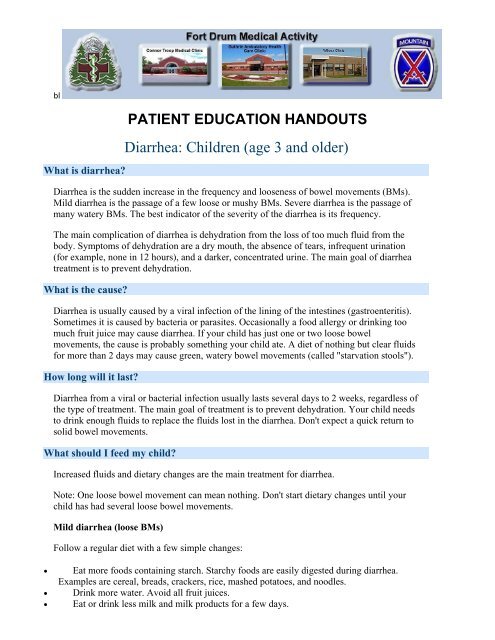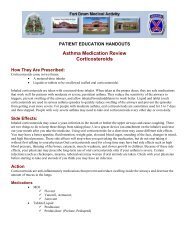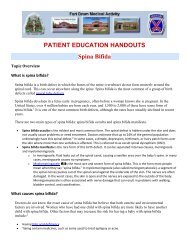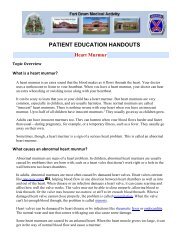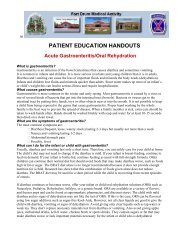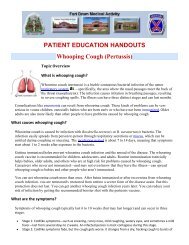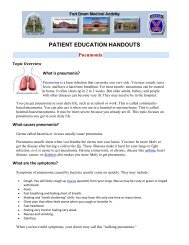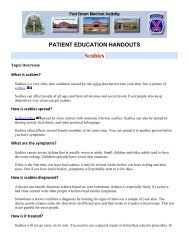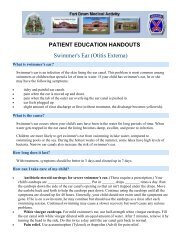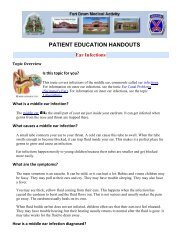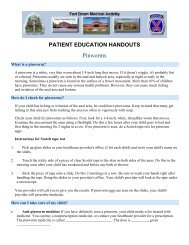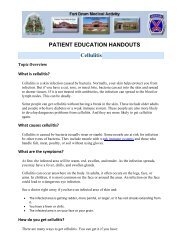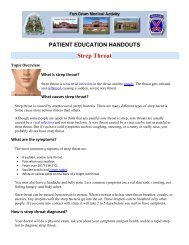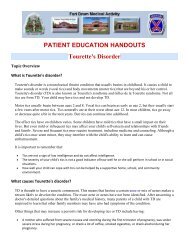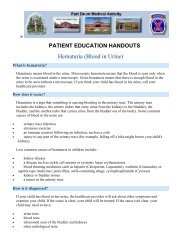Diarrhea: Children (age 3 and older)
Diarrhea: Children (age 3 and older)
Diarrhea: Children (age 3 and older)
You also want an ePaper? Increase the reach of your titles
YUMPU automatically turns print PDFs into web optimized ePapers that Google loves.
lWhat is diarrhea?PATIENT EDUCATION HANDOUTS<strong>Diarrhea</strong>: <strong>Children</strong> (<strong>age</strong> 3 <strong>and</strong> <strong>older</strong>)<strong>Diarrhea</strong> is the sudden increase in the frequency <strong>and</strong> looseness of bowel movements (BMs).Mild diarrhea is the pass<strong>age</strong> of a few loose or mushy BMs. Severe diarrhea is the pass<strong>age</strong> ofmany watery BMs. The best indicator of the severity of the diarrhea is its frequency.The main complication of diarrhea is dehydration from the loss of too much fluid from thebody. Symptoms of dehydration are a dry mouth, the absence of tears, infrequent urination(for example, none in 12 hours), <strong>and</strong> a darker, concentrated urine. The main goal of diarrheatreatment is to prevent dehydration.What is the cause?<strong>Diarrhea</strong> is usually caused by a viral infection of the lining of the intestines (gastroenteritis).Sometimes it is caused by bacteria or parasites. Occasionally a food allergy or drinking toomuch fruit juice may cause diarrhea. If your child has just one or two loose bowelmovements, the cause is probably something your child ate. A diet of nothing but clear fluidsfor more than 2 days may cause green, watery bowel movements (called "starvation stools").How long will it last?<strong>Diarrhea</strong> from a viral or bacterial infection usually lasts several days to 2 weeks, regardless ofthe type of treatment. The main goal of treatment is to prevent dehydration. Your child needsto drink enough fluids to replace the fluids lost in the diarrhea. Don't expect a quick return tosolid bowel movements.What should I feed my child?Increased fluids <strong>and</strong> dietary changes are the main treatment for diarrhea.Note: One loose bowel movement can mean nothing. Don't start dietary changes until yourchild has had several loose bowel movements.Mild diarrhea (loose BMs)Follow a regular diet with a few simple changes:• Eat more foods containing starch. Starchy foods are easily digested during diarrhea.Examples are cereal, breads, crackers, rice, mashed potatoes, <strong>and</strong> noodles.• Drink more water. Avoid all fruit juices.• Eat or drink less milk <strong>and</strong> milk products for a few days.
• Avoid beans or any other foods that cause loose bowel movements.Severe diarrhea• Fluids Encour<strong>age</strong> your child to drink lots of fluids to prevent dehydration. Offer water asthe main fluid for the first 24 hours of watery diarrhea. On day 2, offer some milk as well aswater. Avoid fruit juices, because they all make diarrhea worse. If your child refuses to eatsolid food, give your child milk rather than water.• Foods Keep giving your child food while he has diarrhea. The choice of food is important.Starchy <strong>and</strong> soft foods are digested best. Good food choices when your child has diarrhea aredried cereals, grains, bread, crackers, rice, noodles, mashed potatoes, <strong>and</strong> bananas. Pretzels orsaltine crackers can help meet your child's need for sodium. On the second day of the diarrhea,soft-boiled eggs or yogurt are easily digested <strong>and</strong> provide some protein.How can I take care of my child?There is no effective, safe drug for diarrhea. Extra fluids <strong>and</strong> diet therapy work best.• Common mistakes KOOL-Aid, soda pop, or water should not be used as the only foodbecause they contain little or no salt. Use only the fluids suggested here. Fruit juices(especially apple <strong>and</strong> grape) should be avoided because they are too concentrated <strong>and</strong> make thediarrhea worse. The most dangerous myth is that the intestine should be "put to rest."Restricting fluids can cause dehydration.• Prevention <strong>Diarrhea</strong> can be very contagious. Always wash your h<strong>and</strong>s after changingdiapers or using the toilet. <strong>Children</strong> should wash their h<strong>and</strong>s as well. This is crucial for keepingeveryone in the family from getting diarrhea.• Vomiting with diarrhea If your child has vomited more than twice, follow therecommended treatment for vomiting instead of this treatment for diarrhea until your child hasgone 8 hours without vomiting.When should I call my child's healthcare provider?Call IMMEDIATELY if:• There are signs of dehydration (no urine in more than 12 hours, very dry mouth, no tears).• Any blood appears in the diarrhea.• The diarrhea is severe (more than 8 BMs in the last 8 hours).• The diarrhea is watery AND your child also vomits repeatedly.• Your child starts acting very sick.Call during office hours if:• Mucus or pus appears in the BMs.• A fever lasts more than 3 days.• Mild diarrhea lasts more than 2 weeks.• You have other concerns or questions.Published by McKesson Corporation.This content is reviewed periodically <strong>and</strong> is subject to change as new health information becomes available. The


